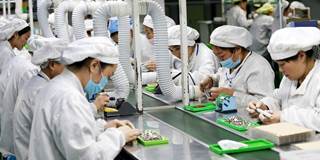The Trump administration is right to push back against China's violations of world trade rules, particularly with regard to advanced technologies. But US high-tech industries' ability to weather the challenge posed by China will depend less on curbing China’s progress, and more on supporting innovation at home.
BERKELEY – With its ambitious Made in China 2025 strategy, China has made clear its objective to secure global economic leadership in advanced technology industries. This places it in direct competition with the United States – which currently leads in those industries – in what is emerging as an undeclared but intensifying cold war over technologies with both commercial and military applications.
With its investments in such dual-use technologies, China is seeking more than to compete commercially with the US; it is also seeking greater military and geopolitical power. And it has deployed a variety of methods – including weak intellectual property (IP) protections, technology transfers as a condition for joint ventures with Chinese partners, evasion of export controls, and regulatory harassment – to acquire such technologies from the US and other trading partners.
China’s intentions and practices have long been an irritant in Sino-American relations. The so-called Section 301 trade investigation launched by President Donald Trump’s administration last year charged that China’s trade and industrial policies, which provide advantages to specific technology industries, violate both US and international trade law.

BERKELEY – With its ambitious Made in China 2025 strategy, China has made clear its objective to secure global economic leadership in advanced technology industries. This places it in direct competition with the United States – which currently leads in those industries – in what is emerging as an undeclared but intensifying cold war over technologies with both commercial and military applications.
With its investments in such dual-use technologies, China is seeking more than to compete commercially with the US; it is also seeking greater military and geopolitical power. And it has deployed a variety of methods – including weak intellectual property (IP) protections, technology transfers as a condition for joint ventures with Chinese partners, evasion of export controls, and regulatory harassment – to acquire such technologies from the US and other trading partners.
China’s intentions and practices have long been an irritant in Sino-American relations. The so-called Section 301 trade investigation launched by President Donald Trump’s administration last year charged that China’s trade and industrial policies, which provide advantages to specific technology industries, violate both US and international trade law.